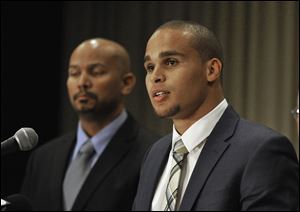
NLRB RULING
Some college athletes can unionize
Northwestern, other private schools affected
3/27/2014
In this Jan. 28, 2014, file photo, Northwestern quarterback Kain Colter, right, speaks while College Athletes Players Association President Ramogi Huma listens during a news conference in Chicago. In a landmark ruling Wednesday, a federal agency has given football players at Northwestern University the green light to unionize.
CHICAGO — A group of Northwestern University football players won its first fight in a battle to form a union as a regional office of the National Labor Relations Board ruled on Wednesday that scholarship football players are employees with the right to unionize.
The ruling is the biggest win yet for those seeking pay, better benefits, and more rights for college athletes, a movement that has gained traction in the last several years.
“Players receiving scholarships to perform football-related services for the Employer under a contract for hire in return for compensation are subject to the Employer’s control and are therefore employees within the meaning of the [National Labor Relations] Act,” wrote Peter Sung Ohr, director of the NLRB’s regional office in Chicago, in his decision.
The players filed paperwork in January with the NLRB after voting to form the College Athletes Players Association. The United Steelworkers union, based in downtown Pittsburgh, is paying all legal fees for the association and has been an advocate for college athletes for more than a decade.
“Our belief all along was simply that these athletes have a right to expect the same fair treatment that all Americans should expect, and that when they work hard and devote years of their lives in service to an institution, they deserve certain basic protections in return,” USW president Leo Gerard said in a statement.
The ruling extends to all scholarship athletes who play Division I Football Bowl Series football or Division I basketball for private universities.
“Obviously, this has far-reaching effect,” Tim Waters, USW’s political director said in an interview.
Public schools, such as the University of Pittsburgh and Pennsylvania State University, are governed by state labor organizations, not the NLRB. But a win for the Northwestern students could set a precedent that eventually extends to other universities in other states.
The NLRB’s decision Wednesday gives players the right to vote for officers and collectively bargain, though pending appeals will freeze all of those efforts.
And the decision will be appealed, Northwestern Vice President Alan Cubbage said in a statement.
“Northwestern considers its students who participate in NCAA Division I sports, including those who receive athletic scholarships, to be students, first and foremost,” Mr. Cubbage said. “We believe that participation in athletic events is part of the overall educational experience for those students, not a separate activity.”
But Mr. Ohr wrote in his decision that the time commitment of the Northwestern football players greatly outweighs the amount of time they spend in class and studying. Athletes can spend more time involved in football activities than full-time workers do at their jobs.
“It cannot be said the Employer’s scholarship players are ‘primarily students,’ ” he wrote.
That, said University of Illinois law professor Michael LeRoy, appeared to be the biggest factor in the NLRB’s decision.
“Players are involved over 40 hours a week during the season,” Mr. LeRoy said. “That looks like a job, not like a student-athlete activity.”
But the decision was surprising to Mr. LeRoy, both in its timing and its outcome. The NLRB usually takes longer in ruling on these types of cases, and it appeared the facts of the case favored the university.
Northwestern will appeal to the NLRB’s national office in Washington, and the case eventually could move to the federal court system, perhaps as high as the Supreme Court.
Mr. LeRoy, author of Collective Bargaining in Sports & Entertainment, said he believes the players ultimately will lose this case. The NLRB has never before considered college athletes as employees as it has with graduate and research assistants.
“It’s a path-breaking ruling in that sense,” he said.
But even if the appeals process goes against the football players, the case still could go a long way toward gaining more rights for college athletes, he said.
The case is one of several that have raised the public profile of the issue.
“Legally, I think Northwestern and the NCAA will prevail,” Mr. LeRoy said. “However I do think this case will leverage a process by which players achieve greater representation and greater compensation. So I don’t think it’s a futile effort, even if they lose the legal battle.”
Ed O’Bannon, a former UCLA basketball player, and Sam Keller, a former football player at Arizona State and Nebraska universities, also have filed suit against the NCAA seeking financial compensation for their play and use of their likeness.
And labor attorney Jeffrey Kessler, who successfully argued for NFL players free agency in 1992, filed an anti-trust suit against the NCAA and five major athletic conferences earlier this month.
The outcome of all of these cases drastically could alter college sports and the institutions that organize them.
In a statement that opposed the NLRB’s decision Wednesday, NCAA chief legal officer Donald Remy underscored the recent pressure on college athletics’ governing body.
“Over the last three years, our member colleges and universities have worked to re-evaluate the current rules,” Mr. Remy said. “While improvements need to be made, we do not need to completely throw away a system that has helped literally millions of students over the past decade alone attend college.”
The Block News Alliance consists of The Blade and the Pittsburgh Post-Gazette. Michael Sanserino is a reporter for the Post-Gazette.
Contact Michael Sanserino at: msanserino@post-gazette.com, 412-263-1969, or on Twitter @msanserino.